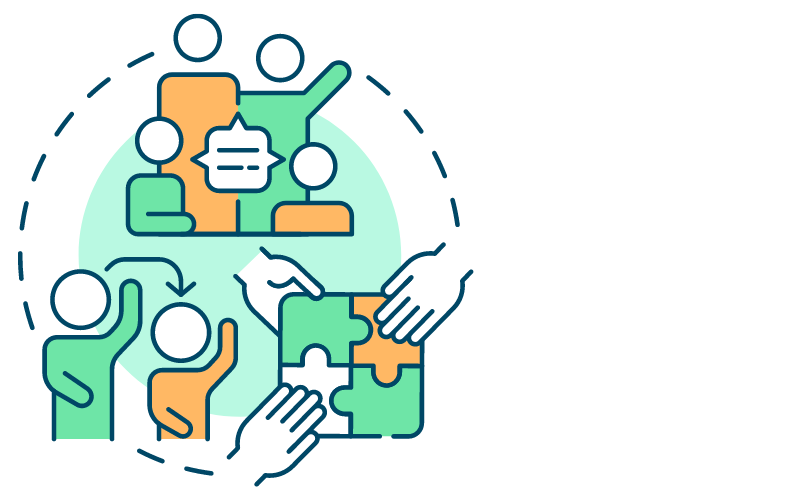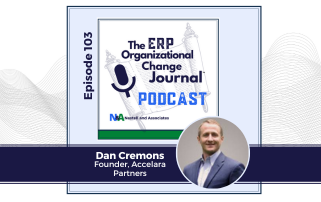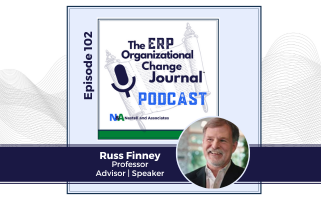Align L&D with ERP implementations to foster an environment ripe for continuous improvement.
Article Contents
What is the Learning & Development (L&D) field?
“Learning and development (L&D) is the process of enhancing employees with new knowledge, skills, and capabilities to improve their job performance and, therefore, the business’s performance as a whole.”
The Learning and Development (L&D) field is dedicated to enhancing the knowledge, skills, and abilities of individuals within an organization. Its primary goal is to foster continuous learning and improvement among employees to help them perform better in their roles and contribute to organizational success. The L&D field plays a crucial role in helping organizations adapt to changes in the business environment, develop their workforce, and maintain a competitive edge in the marketplace.
“As L&D professionals, we spend a lot of time and energy developing training programs defined by learner needs and matching the topics most important to them. In practice, L&D teams identify the topic, create the content and distribute it to learners so they can gain new knowledge and skills. But once the learner has obtained that new knowledge, how do they actually apply it in their job setting? There is still an enormous amount of work for learners to translate and transfer knowledge before it positively impacts their performance.” Podcast guest Guy Wallace, performance improvement expert, shares in this podcast that “L&D programs should give preference to driving better organizational performance. ‘There is a need for people in the training field to take a more performance-focused orientation and become performance improvement technologists’.”
The L&D Podcast – https://360learning.com/blog/l-and-d-podcast-guy-wallace/
How can ERP practitioners benefit from the L&D field?
ERP practitioners can benefit significantly from the Learning and Development field in several ways. To name just a few:
- Skill Enhancement: ERP systems are complex and continuously evolving. Effective L&D programs can provide stakeholders with opportunities to enhance their functional and technical skills related to specific ERP platforms, modules, and functionalities. This includes training on system configuration, customization, integration, and troubleshooting.
- New Module Adoption: ERP systems often offer a wide range of modules to support various business processes such as finance, human resources, supply chain management, and customer relationship management. Effective L&D initiatives can help organizational stakeholders learn how to effectively implement and utilize new modules, enabling them to optimize performance.
- Process Improvement: Effective L&D programs can empower ERP stakeholders to identify inefficiencies in existing processes and leverage the ERP system to streamline operations, reduce waste, and enhance overall productivity.
The L&D field offers a great deal to the ERP organizational change field with methodologies, best practices founded in sound research and principles that advocate for effective organizational learning. Leveraging the “tools” offered by the L&D field can enable ERP practitioners to enhance their professional capabilities, drive successful ERP implementations, and contribute to the long-term success of organizations.
Effective ERP Learning and Development: A Key to Organizational Performance
In the ever-evolving landscape of business operations, the implementation of Enterprise Resource Planning (ERP) systems is crucial for organizations seeking to enhance their performance and adaptability. However, the successful adoption of ERP solutions hinges not only on technological proficiency but also on the cultivation of a learning-oriented culture adopted and highly advocated through executive stakeholders commitment. Recognizing this, organizations benefit from investing time and effort in ERP learning and development programs tailored to equip stakeholders with the requisite skills, attitudes, and knowledge vital for navigating the complexities of ERP organizational change.
Understanding the Learning Landscape
Drawing from renowned frameworks such as those proposed by Kirkpatrick and Kirkpatrick (2016) and Anderson and Krathwohl (2000), these ERP learning and development initiatives need to be designed to address the multifaceted dimensions of learning, encompassing both cognitive processes and knowledge dimensions. Let’s delve into just some of the essential organizational learning goals outlined for stakeholders embarking on the ERP organizational change journey:
Understanding ERP Dynamics
Organizational stakeholders must grasp the foundational knowledge regarding ERP advantages and the challenges inherent in organizational change. This entails recognizing ERP as a driver of business performance while also acknowledging the intricacies involved in ensuring successful implementation.
Understanding ERP Critical Success Factors
Delving deeper, stakeholders are tasked with comprehending the critical success factors underpinning ERP success models. Recognizing the contextual nuances of each component of ERP implementation success is imperative for effective decision-making in the transformative ERP journey.
Application of ERP Critical Success Factors
Beyond understanding, organizations benefit from applying ERP Organizational Change research adeptly within the context of ERP initiatives. This practical application is vital for translating research-based and anecdotal knowledge into actionable ERP implementation strategies.
Evaluative Learning
An essential aspect of the ERP success learning journey involves stakeholders critically evaluating their own learning process. This introspective approach fosters ERP implementation continuous improvement and adaptation to evolving organizational needs.
Fostering a Learning Culture
Executive stakeholders are encouraged to reflect upon their own role in nurturing a learning organization and fostering a transformational culture. This metacognitive awareness lays the foundation for ERP implementation success.
Critiquing the ERP Implementation Process
At higher cognitive levels, stakeholders are prompted to critically assess the utility and value derived from ERP implementation efforts. This evaluative mindset fosters a deeper understanding of the organizational impact of ERP initiatives.
Self-awareness and Accountability
Stakeholders are called upon to evaluate and learn from their own attributes and contributions to learning outcomes, fostering a sense of accountability and self-awareness crucial for driving meaningful ERP learning and development progress.
Building Confidence and Self-Efficacy
Finally, stakeholders must cultivate confidence in their ability to discern and leverage success factors effectively. This self-efficacy is instrumental in navigating the complexities of ERP organizational change with resilience and determination.

The L&D field offers a great deal to the ERP organizational change field.
Effective ERP Learning and Development: A Deliberate Process Based on Sound Principle
Central to the attainment of ERP learning and development goals is the concept of scaffolding, where knowledge acquisition progresses from concrete to abstract dimensions, mirroring the iterative nature of organizational transformation. By adopting a holistic approach to ERP learning and development, organizations can empower stakeholders to embrace change as an opportunity for growth and innovation. The journey towards successful ERP organizational change is intrinsically linked to the cultivation of a learning mindset with starts with the executive stakeholders. By equipping organizational stakeholders with the necessary skills, knowledge, and attitudes, organizations can navigate the complexities of ERP transformation with confidence and agility, driving sustained success in an ever-evolving business landscape.
Conclusion
Concluding our deep dive, it’s evident that the symbiosis between Learning and Development and Enterprise Resource Planning systems is fundamental to fostering organizational excellence. This discourse has illuminated the indispensable role of L&D in not only facilitating the effective adoption and optimization of ERP systems but also in driving forward organizational objectives. By committing to robust L&D strategies, organizations can unlock the full potential of ERP solutions, navigating future challenges with resilience and securing a formidable position in the competitive landscape.
Dr. Jack G. Nestell
Elevate Your ERP with Expert L&D Strategies
Boost ERP efficiency and adaptability with our specialized ERP Learning and Development solutions. We’re here to guide you toward seamless ERP integration and enhanced performance. Interested in a custom L&D strategy for your ERP?
You might like this Related Article:
The Value of Proper Organizational ERP Training and Development
Related Podcast Episode – ERP Learning and Development
Episode 19: How The Kirkpatrick Model Enables Optimal ERP Organizational Training Evaluations
Latest Podcast Episodes – “The ERP Organizational Change Journal”
Human Capital in PE-Backed Companies: Strategies for Leadership and Talent Management
Human Capital in PE-Backed Companies: Strategies for Leadership and Talent ManagementEpisode Overview - PE-backed Human Capital Strategies Today’s episode centers on the pivotal role of human capital in PE-backed companies, emphasizing how strategic leadership and...
ERP Organizational Change: Technology Strategy
ERP Organizational Change: Technology Strategy and Keys to SuccessEpisode Overview - Technology Strategy In general, at the highest level of categorization, there seems to be consensus on the importance of people and culture, informational technology, and project...
AI and Private Equity Synergy: Fueling Business Transformation
AI and Private Equity Synergy: Fueling Business TransformationEpisode Overview - AI in PE Strategies In this episode, we explore how AI and Private Equity synergies are fueling business transformations and reshaping investment strategies and operational efficiencies....
About Nestell & Associates
Where People, Processes, and Technology Align
Nestell & Associates specializes in providing M&A ERP and IT consulting services for private equity firms and their portfolio companies. We offer a range of vendor-neutral services to support all stages of the investment cycle.
Moreover, we know how to effectively minimize or eliminate the issues you experience during M&A. With Private Equity Technology Solutions as 100% of our business, we bring a unique approach to ERP that other firms can’t compete with.




